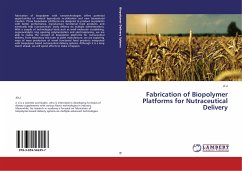
Biopolymer obtained from starch
Polymer chemistry
Versandkostenfrei!
Versandfertig in 6-10 Tagen
24,99 €
inkl. MwSt.

PAYBACK Punkte
12 °P sammeln!
Polymers are responsible for a large part of environmental degradation because they are derived from petroleum, i.e. they are non-renewable sources and take hundreds of years to decompose. The general objective of this work is to produce a biopolymer from cassava starch, and the specific objectives are to extract the starch from cassava, promote the acid hydrolysis of the starch using 0.1M hydrochloric acid, develop the biopolymer and analyze the decomposition time of this biopolymer. To extract this starch, a number of unit operations were carried out during the extraction process, the main o...
Polymers are responsible for a large part of environmental degradation because they are derived from petroleum, i.e. they are non-renewable sources and take hundreds of years to decompose. The general objective of this work is to produce a biopolymer from cassava starch, and the specific objectives are to extract the starch from cassava, promote the acid hydrolysis of the starch using 0.1M hydrochloric acid, develop the biopolymer and analyze the decomposition time of this biopolymer. To extract this starch, a number of unit operations were carried out during the extraction process, the main ones being crushing, straining, decanting and drying the starch, which was then weighed into 5 grams and heated together with water, during this heating, 6 ml of 0.1M hydrochloric acid was added in order to promote the acid hydrolysis (breakdown) of the starch, and in order for this biopolymer to acquire a more malleable form, it is necessary to add a plasticizing agent, to which 4 ml of glycerol (glycerin) was added.














